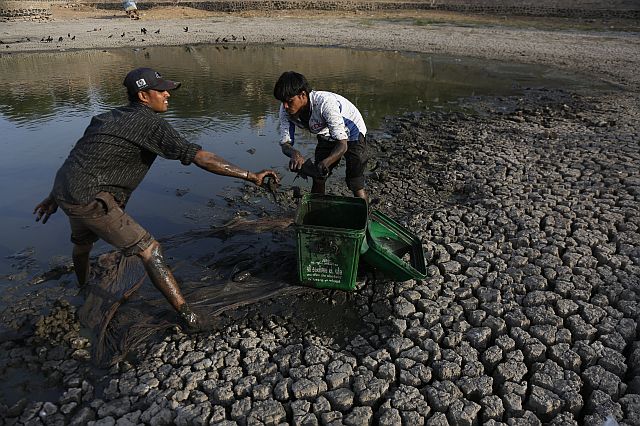
Indian men remove dead fish and try to rescue the surviving ones from the Vastrapur Lake that dried up due to hot weather in Ahmadabad, India. India is grappling with severe water shortages and drought affecting more than 300 million people. (AP)
Temerloh, Malaysia — Withering drought and sizzling temperatures from El Niño have caused food and water shortages and ravaged farming across Asia, and experts warn of a double-whammy of possible flooding from its sibling, La Niña.
The current El Niño which began last year has been one of the strongest ever, leaving the Mekong River at its lowest level in decades, causing food-related unrest in the Philippines, and smothering vast regions in a months-long heat wave often topping 40 degrees Celsius.
Economic losses in Southeast Asia could top $10 billion, IHS Global Insight told AFP.
The regional fever is expected to break by mid-year but fears are growing that an equally forceful La Niña will follow.
That could bring heavy rain to an already flood-prone region, exacerbating agricultural damage and leaving crops vulnerable to disease and pests.
“The situation could become even worse if a La Niña event—which often follows an El Niño—strikes towards the end of this year,” Stephen O’Brien, UN undersecretary-general for humanitarian affairs and relief, said this week.
He said El Niño has already left 60 million people worldwide requiring “urgent assistance,” particularly in Africa.
Wilhemina Pelegrina,a Greenpeace campaigner on agriculture, said La Niña could be “devastating” for Asia, bringing possible “flooding and landslides which can impact on food production.”
Vietnam, one of the world’s top rice exporters, has been particularly hard-hit by its worst drought in a century.
In the economically vital Mekong Delta bread basket, the mighty river’s vastly reduced flow has left up to 50 percent of arable land affected by saltwater intrusion that harms crops and can damage farmland, said Le Anh Tuan, a professor of climate change at Can Tho University.
More than 500,000 people are short of drinking water, while hotels, schools and hospitals are struggling to maintain clean water supplies.
Neighboring Thailand and Cambodia also are suffering, with vast areas short of water and Thai rice output curbed.
In Malaysia, the extreme weather has shrunk reservoirs, dried up agricultural lands, forced water rationing in some areas and caused repeated school closures as a health precaution.
Disclaimer: The comments uploaded on this site do not necessarily represent or reflect the views of management and owner of Cebudailynews. We reserve the right to exclude comments that we deem to be inconsistent with our editorial standards.
